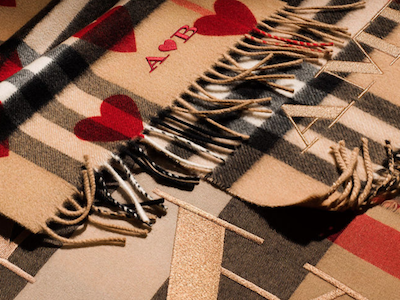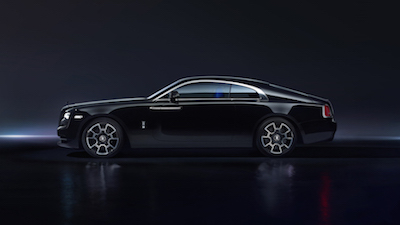The United Kingdom’s European Union referendum vote caused the pound to decline in value and, as a result, affluent Chinese are finding the country an attractive travel destination, according to a report by Hurun.
In its “UK Luxury Brands in China” report, a focused summary based of the “Best of the Best Awards 2017” survey and the “Chinese Luxury Consumer 2017” study, Hurun explored the impact British brands are having on China’s luxury consumer. British brands and culture, in many ways, represent the old guard of luxury due to dedication to heritage, quality and craftsmanship, concepts that align with Chinese sentiment.
“The drop in the pound post-Brexit certainly helped the U.K. become a preferred travel destination,” said Rupert Hoogewerf, chairman and chief researcher for Hurun Report.
For this report, Hurun surveyed 449 Mainland China millionaires with personal wealth of RMB 10 million, or $1.4 million at current exchange, between September and December 2016.
The best of Britain
For travel, the UK saw the largest jump in placement, moving up four positions to number six in Top 10 International Luxury Travel Destinations preferred by Chinese consumers.
In terms of fashion brands, the quintessential British label Burberry is struggling among Chinese consumers. For women, Burberry apparel dropped to sixth as the Best Fashion Label while for male consumers, the brand fell six spots to eighth among Chinese shoppers.
But, Burberry did return to the Top 10 after a two-year hiatus for the Best Brand for Gifting by Men. In this regard, Burberry placed behind L.V. Moutai and Chanel in sixth on a global scale.

Burberry monogrammed scarves
The survey found that Chinese consumers prefer shopping at British department store Harrods. The landmark retailer has now won Best London Luxury Shopping Destination for the fourth year in a row.
In the jeweler sector, Backes & Strauss was named Best British Jewelry Watch brand for the first time.
The UK automotive sector is very popular among Chinese affluent and saw excellent performance for the year. For example, the survey named Rolls-Royce’s Ghost model as the Best Super Luxury Executive Car, followed by Bentley’s Mulsanne.
Accolades continued, with the Rolls-Royce Wraith winning Best Super Luxury Car for Self-Drive, followed by the Aston Martin DB9. Aston Martin’s DB11 model was named Super Car Best New Arrival, while Jaguar’s XFL won Executive Car Star Performer.

Rolls-Royce Black Badge Wraith
In the SUV category, Range Rover won Best Luxury SUV for the second consecutive year.
Although travel to the UK has increased significantly, residential property purchases only place London as 14th among the cities most preferred by the Chinese to live. United States cities such as Los Angeles, San Francisco and Seattle lead in this regard (see story).
For real estate and auctions, the Chinese favor Christie’s, which placed as top Global Luxury Real Estate Network Star Performer for the third year and Best International Auction House.
“The appetite for collecting by the Chinese luxury consumers bounced back 10 percent this year,” said Mr. Hoogewerf.
All abroad
While luxury goods consumption and interest is on the rise, Chinese travel is also increasing.
Travel is an essential part of life for two-thirds of China’s outbound travelers, according to a July 2016 report from Hotels.com.
The 2015 Chinese International Travel Monitor revealed that even with the economy sputtering, consumers plan to travel more and spend more while traveling than they have in the past. If China’s ballooning affluent and middle classes maintain this behavior, they can offer luxury brands a reprieve from the otherwise tumultuous times.
The influx of income among international spenders is good news not only for hotels, but also for retail brands. For both the top 10 and top 5 percent, shopping was the favorite activity, even beating out sightseeing, suggesting a constantly growing base of consumers from China to market to (see story).
Purchases made while abroad are seen as part of the travel experience for many Chinese consumers looking for goods unavailable at home or unique to a specific location.
Hurun found that many affluent Chinese are reserving more days for traveling.
“Chinese luxury consumers continue to be extremely busy, away on business trips for eight days a month on average, up one day year-over-year,” said Mr. Hoogewerf.
“Despite this, they take 10 days for holiday, three more days than last year, whilst the super-rich take five more days than last year to 15 and go abroad 3.4 times a year on average, twice for traveling,” he said.
{"ct":"gEn5La2iIESd0f0zN\/sh4FjNWe549xGzKhXBRcgeDk3NJpaWP7HAN23VT4zHKgatTzr6\/yHTc4NPoBCNk5sTBQD1Ip2jUioLczeaPgOj7DSOJ6b2W7J5O0XY4lcHwRfcmNYKV0TkEd1Yvx8IhnIw7h49xcX37UK648dga1Fubf1zCiWVfCkH5a+KenQCreeFdWlYOdVmpSPeD3qG7OYYu4jlw5clFeu6\/ozzfzOGWv26AR\/birI7XpjHhO2QW459esIU1QTrXPKCsT\/uPj7vTn4jAo4qc24SaRZepHFw7qeIv1QSZPNZkyx2NRp41K0sIow21dR4nNKiHbvhjeOOsoSsKiae75nnzui+Uab+pR3NWENgm9mTIkfyq6uMtn4cd+aHSOBp5f9HvUqfChu\/9Lor4WVca1VXwHG+oCPP8fn6tdLmTbaehkiuTWYUAfWKrs+IL5xbAf3\/Dp9EyBWWY3emyl52oQfEAu\/r2NjLnyEn+qTqKYyhZf06R7TmV92QhYLrDqAgjtdLdFybR3d2Cs09loK3wi9qvaFnKuq7yBWhqxkxNXvcGY8W+UQyYBypwJQLmRu33r5tgFoMTOwB\/CZPhsCleXz0DJh323mfKHibLqvspNzmgGrRAuBzqnzRTE5Bf1rD2DmlwjScxFxmhdRSHMJ9eedNwbDUdeXTAFrtCtn6lgOIG\/8sZVq9oBWOCGeJJ\/7GnMKyJcvVy23t8XQN5pQHIGQKEoZe08B+7pdTCo8FfHnjRR9g0hGC4lyD467+vcdahmWuzXSCPdeOv4LEyUUzvfbmw6MsshaEplpeFevi5t1qP0FbrC82UmwsdVMzVjyu6nbKlQsHPIkmfrDFsDaLh\/9H1PLEyE5I8xPJzLADaFWDVZ9ShSurWL21SadYMSUn8drwQWtzO9r0vTIwHvT7ejdS3ibUFZiciu+a16\/B64EJep+4jRB4Dpncs1LtEoARTL1f2TbY1iN+l0PWbscA5zMXfLhLvATiSI6KkvrvamVwq078oRwetLbqLBFR5RXdDt9hv3WSBlWVnwWvRo+AApjDGgIPh7IkWVimIY7kFJq7kX9X\/RpUo8VtklDx9uAU+CsFCmFEUworUiIjpUdldVi1FhKn9PrXLeAl2iom2iNKufrFCSh4ZGg+n9mBw83V1DJtLn7b5qJ9LDb0MnsRGkr\/vSnV\/vF0iaC98+lT\/8YCDToFyBAlejFV\/7SMU++iJXFZjiJFXKokIJJhMpiFdlr8v5VcQhQMcFjav6yQzU8wlqyq9SeswXs\/QVNbtrL02IUfpH1B7S3C22rKXa072M5lkX3\/gwM4oLp\/5HMjHo1SUZnTQmaGRxmud0eZBxlrl99vSRE774eLJdOLtP0CdUBhrDRFR5J4RUJSE8eXhv0mysMap5csx95OqcMrxOIc+WtSXvzkM\/VFbgsyzVasp1pWOFsvMVzfW+gP81zg4mxf1xk52mzW3u\/SwQ9nzZ22CXn1pC5mr7C6s+TfQu7oiH9vtd65DcMA\/VqGDLCKOv+hX4g9nZY9nwpCanin5vf7sY8iM87r2Bi1CxIiUnQVSo0XJJHCerqMKxxKNHhFm+EsOgKad\/eqn71bxmBqusTAS+vpd+HnFHIin2ZG4kH8z4pDEv5iNzfX5KJHVXdfKhgHVvIFa0UPVQgKGc4ZPBC5PYY4DixJjhstCh\/qAM5M82REFeFllMHC0mIoMzhrFNojP+XsDxonlNmM\/XDq1vc\/uPAB0AFMXvDH+4syOIIur2tCqvbdPz7kb4dNrzGVobh0\/xj4qQkZiC1sLWdX2YDqobn5Jns22n5v1pvSXYUFrKRjwFciWnJigbZ6O2y2PB7I3UzGsStlrBlCxKNtCezNR\/h5ZW+oyjf9nI8ZXHVBUJfOcFzsjIrjgvAT73N+fWgCqEPxQO9L6MfqVx\/S8m1xm3AN0yf9rUiOlINUvytdrpRzoxD1wTKLBldi3itLagmNKGzMZbcRK+2ACr8cCVssfY4aAalAl7Xmq8jKi6ooGB4ikUAJeUUh2mdbWTqJuuTDztBsCj6YWKEbrWUn7Bs4gxC479\/tTh3W58UVWax4m8R+iVyj3qamUE328WSU8wljEbFbP3FLo7Nmk1N\/J9jyUJMD5ohmNxQTzzQ2OLLAbYNpsMxx8ta1W4UPrjSSSaqQJkvP+AkwfXEmMzY6VaJnClT9ogRqCcZNWntzHLIOvPnFsDWWa\/bUOveFO9ikI3QbPX\/yXZXi8Yaa2Ru\/twSI3hlvhJUb3+EqWkHJQniJP6WWofIhmfvnnq0Svs4bebyfX7iKKAEoDY6yCJ13Qb09xWk3QEGhS5EgCcGMqN1OJiqGxyV4X6pvJiBWD5YVtOfe0qBi\/hclP51P2XPpuppOa7QH\/EJSLRNUAQTB7tW3a0CNtNtZFg9RH1HnGa6znVstZXLCGcmOld94GwcfOFxUwMAsD4GbG22qlm500Fml5L4muQiJvyMpXYqweEVkdONaRFZ5nxnon3+vQzzdxA10V4\/wDW4z5LzEEe7eng6S3UCve1E0Oy43kYgmyq\/B5UYiPh+iC1TZunr1OZ3EfaKC3yajDKJ6QrjifSwAp\/SeAOSgOZ0To1AEt9RCzs110eUIZ67+6nGcdEmXGvVTypvbrC7yPI6A3yIHzmVg9sArmm5OgiM\/p8lxUb5+j90yYyS\/acH2CJmCYDTXlFbuuJNkm4iiHp6UUFKX\/U6y\/Y7kcgsmivgwgm6SEgloTxAS9zQA0WwGoVJJjPxQuC0+H1Z0OjB719vBuTgcwDvXEzQqwc+AP7Hj0y0KOGyAXWhQ2l0hYoZ8CPch84OG13Nrsp7JY4dmzJNLixH9XTdHmUEc6wgWlxyiejTFV\/sFmOkGiZOkC0V3fFqzjN5DNa+1L7X1leCCDQ9v69ayY6dX\/SWYgMz\/8XU31OmQZTjyAgPQ07dXSFGv02GK0T+0mqInw7rhhYjqS+wgi+R8\/Pd8Us5GIk40XOWwFopJ8hY1w4Isx9g1rDPDT5HWyJ\/OR58rzUM+yggf6AvtkI1iNULk5BJLVMLQ8lYOllUyhMYnc3aVZ5MF6WoLxpE4KXGoSgeuLN7B6a6QwdrHWamsm0KSmjCxv8dtxhME5j\/a\/P4CBsYGCsu14\/tGEV1sldBhjlPVzD5NDwGkL8YNHT4LHmDTje0EjzrH3FMLhoy3Y8zJBS7hZNM6lJ58lL6elfUqCHxlcb111A8c5TwYc8xRrnumyBS4dD7B+ZP1IIMonoS3XW8dPj2ri8nu6B3OaLtd1WBD\/IBSqLZO\/Vl9RKVRZkngLswvnPTpqgfrjyTw\/fv7XxUCvQDbHc0pIF\/B3yKOeYcHD72Q+D2h52hR7+7X1OaPOqnKspOuNVt5gt1QGmcqs5MvCcf5kGQ6DP1W7B2wgS0xEYOvONMW\/1rU+j2Dyb+mHtTnYszuon99i79KSA\/MBKTllj80qSh86vcv0LOmOdwZqZfoO5KQTEIWgbiwnOMyWp7bzmU3FaknAWAOZ73i8LlSKFEG5FLlSSzof3yY4TOqD0vTdPF21Cf4fmaUlQ+5ogcFY7lWfTe1tm8anYQ9LRpEA9wO\/ODBc65owJXepvkwgQ5CtlxHoCLjkvrv2ERRNTYeDm7ozrqImvyH1EvYR7RGxpgL5xhnsiTj4pbIxzxeG1ILJk5vRLVJ904TK6bUFjtjkcGGkNarnvLHkylIJ92sZkfDGbRsTZbRm6izhPehrNeCoGGSw7Av4S\/pXEn6U+7m3I\/Sl2RpwEvS1jGzPcSsVUH0NYwzzw60K3oyeTNHtIU+SDMnUHWAj1ikN3Tt2wM\/JJLz+LUFsHgndE8wWRt3Q\/jbJFZU6N2k0Y83+d91Hd03TOUBnSSn1RjkLY\/+nVoHrj0P2rhiaAMi5GEhtyODsEsxT6\/ZNtg5+P6CIZsK6aTSNvJdozSIvmVUi96tMY72O4OxKlmvS7lgdpY7eg4WlDmbICUF\/6oiFycdT3Xf4dCP1xM2y1toBl\/P0SfxGbo3t\/es6fnnVkiwnmHwV3BGUDVqRuHr7O49ICjQr9sSXSjUvDuGb3xfCRGa3bR5TFdlOOClJu1LvwlSlmft3FcMxAtCTH1wOnl\/TDBHwCO708drepdlpnUYwcDovqfPsx3ct3WwZYqTREe3mQo8idv2d5SKEVC02WluX4J3KWqdn3GbUEFYBsM2bxbRMNymXe8+v94O\/S+W+oOrZLd4dhfcmDYTibXJbj\/RhVMCmlsGeD+c6mtGjXjAkh2aFwvb8tyUslMLct+8tlJgnIoLnUGzauAoDUslmQXDv3pCUlauMUSabccUVYVeFd\/TImImD3ewiKuHLJktPVVph0+BJMIZMjcp+rgVU\/uccbWNArvkDEUTPSQeMujRQX8MID\/5SWdc1K4z8W4X0t2F1uztZSgFpgqdSVyh\/W6lzKSjXPwV2Rrlwo4Gup\/F0MIazlF48fxF0knE2uiAGTJabfsZJMwHjk55smu\/H4OwODNnFOps8yv07ADGQzQwVU1buTRMG\/oCP6WOYQEfCGV0UkXs2Cc5JSFmb+IzfGJoeFvP+DFzyE7aXhlzoJsmhgCC25olmmVhdbFGz2mLmUuYa73z+RnqwjudUgBq68Y5s9YvK6YcbwBhot8tT+wdbH+n6FXL4AqcujZof5vLKUHDd2dOVy6HTbzOVc9LBavAWH1AWxXSKeOqlIlXHAgt8jGQ\/7hhKKBs39ZJuL7pk5YuxiaAqsissZGX5sVcLcGswUSpzbdSAvxyaLVQNhxgjkxuIkSa4QixWFX\/5YFZITwF7ffV6JfIQ4E+mzJPTfbGbKJnqV6ZBJhGOpBa+Q5FnjbeuqJH77h3dEjPrI+HcuymZS+9ggOctXFxgvd6cCqV+AJ4VzCA8H\/7zAozDkQQRq8UBqzxBjTkzd\/heFTcbyJr9+qjLXNBJIyY+pohv1pk1teDU\/OO4OIP2Azj6n\/MmwoRqUD9r5EDehV7H3j7WqqEKDp07WPsYt4pCIu0+jEJvStTTDpCnC5R3UGrBocHx\/\/D68ExAr\/+vyN2HWRX\/QUXHAqN9e0UFr+LKtnNLFVVPsvqOwx3GHaWlGLY6bO4zA1XSp0civ6Gk9QLB0Kp+CAQbQ6KUmQ9iNbC9QqCcEfUscjjKDmiG8IMuVZaglvohU2uikvgM7TFbHSmaV1YRH3\/pScaUhjXGn0O4QgAcubdWxfcpqRf1HNRqdJU98PLWQeYDZvuDaOiw0LHlDPbj7fTnebEkqlkmHhdedFPBl4f3TKsy1Gi+ehNOLo2+5lSOUnl0RHpn5SSiUZip9OJ5hPzkhN9taqNttD2Xn45cqi+bIOBytbCerJ0AKQ11mv6AMG2S7Ersnt6jENnG+GQWoLkZsLSkRKHsUWXDXMaXw3g9285yx3ENcXpLCYqyN\/jRv17YNm45Gqrfcf+9970\/qLFkYjd1lFPlCg1GUY6+e+AJUe\/uipTFqDI41qNpRIzE7qzAh+PIv0Jobp\/jiVCRWv8ytXklwje9x9K1ZaGFrbWK+6OVGNnfFwyWJ78uF0piCcMEcFrAAHtPF4ceX93\/B1Ssk32uJk7NKMz\/Yc2wYBoyIxONvRJSIJQxZ+9YA\/XnZYgXTAmaix\/8UGYMqNe\/PCLXJaqEAkPXsaPQsjBgOnOs3fK\/NBUfkMB1\/Wt5rRCK4OoN8lsm322BGJdwhiPXs0Vm28JKcLT3AaCJqagPI2FMkmw9\/FnPb1tf2XKLZ+mYS8F89nxpel6y+CrOqHYN+PXev11eavjaCgKQJutn7ipVTKyVQ54S1\/JVuH7yy5\/\/CfXC1E8oc8rOEn4TBJqc7DLMwfaopQzqWaNy+jmRP1hgrn4zt\/eKqGPu40YlhrIEeojh+ugSdqMJ93rdvHXIjnGn29WuPvqfciXrt1Ob7o7iHbzoKrMmUWToGikN8FVXD2pRWMCet2WCSIjNmRgUNAXJE9E8+pqrAXCsb8+2fsFQU28jSSsKFrNqLbin6DoP4qx1Qhvo9swiF\/2NLQhUeTB73gtcoim3TpJNBGokX5ddaKozGQv7YUmbsBPNkVHjcdqrU9e3zoH9VXCSndx2Oudw1ojXFrg17OAoAOuozNOfQFnTlkEsf\/YOFPCX4HA+9qLQjW+aQuZHHWEhAHgAZge4AvnZmzwP17w4VKU1Vu6yho25QwGU7R69u4\/yVEwTeqPDF6gh64uyrQkVacykDaVQw6PVTHBs+QVLcml+kutUPLrBOP15wdxXEwi\/yLbRYVtD\/yYfdncbJfLTULwwJiRNKe1GHwWj3m\/iosdZSFQE8vwTa2PvxWAyanCK+NMZuTZAPCqpeZlJDMpHPiOnx1YCRjRlwAlcBjOZKg4x01X7Q5qyNdO8WhOMTaadHo2c4LFvLoUzR72MfmqZXXxDNdeYJJDALudgZZaZy4\/bnYyAaQagqctIKi4cPWVewxBcAGIgSsr2HYNDUfWb99tuyTLOX19W4+xXunavpuAPW+MM19h2iBr7Y67OKh+VywX1G+YjM5kJzH4nP\/dDaZksAwners\/aPlJyFrlBwOOBvxEvMZNbXK7BjTne2MNl12jxoXqnkTeT+mTYEFgHWm+Kppwv6G0BhxC9qehFx5Z6d9zmTAzT+uHwdm+qAwnjOR+uGbZTdRe0gKMhqukGoqeBGpurXBxFc5+7LhgrcZMo0jbOiQcLW3WTZ7IxZWfkFH2a8tlmQYCyw\/optovnSHdoU\/mbOVzyDAjfE5O+8SoHR3IQ1QVJVdHJ6RSUFJqSoWBzCOjZ39gglYRZI8157nw9MBgG+57BIU8Gn+1x1\/UPxThA2iSb65nDa5HQoxGgkp8vbhqOFMNibOBtgJ4Wh\/pQukXcmam5zVq5rX9+XvHH3b6rqTYtNFdaTf7H\/uxdEBkFEZS+obM9gOKdziI3fgC62BWi1NSitgtyEY6AnKZujfH4q\/6TY+LP2WtuFgcCUDrXiEer3pi6m9Nf6vgHK2Y6udh4PnhuYOv1uayKLgkHqv2d6Kx+CCne9bWiHRSUOU+VpLy1QxL2qOWfzg22h+m0HGQ2daDZPsTriqjGZ0mQiUTp05PfqLRyhbzTVFtf6b5uyqPjVOgPvrfidKDWRIBhTj+73vhz5\/MrEidhbYVsu+1g0h\/ZOriTNyIUcZugWTa3bCyMV5PitgYsvhec388JILZkFZVd1R8YHKwjfEmIvHSxpf2PYw7teQEfVuyJAQxptKkTCeDsrn\/zPJ5yYa3mNLivot4NopFU+VYSJLbgvFcUhMLA3usJd4cYAkwYKGlNwETYJFDZ05Qh2hLHS2wvorzw1erF6YBwe5jebgOAitD5+t6P6a+fqaTWEPT7+uwK7HdydFZPP7n\/eRClKY28kS7hgLGbR\/uNSoQeR57EPmnEk\/fYWqhIrsu5rxg6UI\/BruW3wqINObrAY3s5+Dyr9wyFwElBwQd2nVHOx1AZRlRPgK25XGeRagfkD\/rUlkDQIg1EaG5C48KyxM4VQvuo8SFb\/S6YehdbKr3MTyELVdwwu84YxtdPZ\/LI2cCJQ8MGV+3VubDTpcFkiAMUdes4lZYxovw7J5\/RbWwgqpX7roKloLnjEGXVH5RhrhWYMwJ1ErRuBGPD958O6tyh+QCJi7USA1xzRBRGEA8qGUTemsX5YC+7X287wIufRKI802DfCCteCK36P3Cti\/NMl4fnyeAXzRwSLX4eDvCnydCi4z6kmH5qXgE69g0vmyHdXQe+QCCFpBngVSInJ3TrPNeous1DSIsHaTYXKlqO7Y0k\/rRur5iQ2Bw7Zg73VFigbGVdQMOrGEsWNq9z6azgFu4DJhRClPrvUJdLFHtUQJUi7K8P\/XS+wvqe3Fapz41fYeiqrxsgSHLjDyNYwebwhuk87x0mI5hFHfyABkyAISWy\/wBXgw8KhxmVQJWGbAOmRiqVnkP\/NjALbSrkuh8r8gr9AS0jQI8KFwdYfibl3LJVD5cpzuYjI3iMNTJpOaONzzMZftQ\/zoLQER8EGwCAtiG0uEDCknwpgCE\/fUfnzpON\/bK9MC+I0gS0LPDVkVDZeY7kwKi2FpNnCCaaiHKSrc53RIcWIGdmIFo8hlM4hWVzsX0Tjbf2TYLxJLSJp9VAVYNZgxvN4bkLZKtLlyD+MAy4VFgNIUnuOIET3Idv3pQCZ94mYqa8Kttu17l2fhTRAaJMBnGKcaN13FsCCMAB\/dyV+zFT3C4P7AXQHzqbV\/nAk5mEAGUFoue0cP5wGKGWNQ6ZbdnWD5YjC7uu\/sgQo\/2m84SEmEhU9sogdtMd7lmKVHv2YEYz48a+Xe1VgxG\/XX2tEXUDl9ozc6ZJY8oXdWHn3VSmCyGFYXQ8AWKgiqXXvGGYYui","iv":"3a784a0c76b39e951b3fd20c9a155ac2","s":"0cec0ed021b14fd4"}

 Burberry saw a decline in interest among Chinese affluents
Burberry saw a decline in interest among Chinese affluents